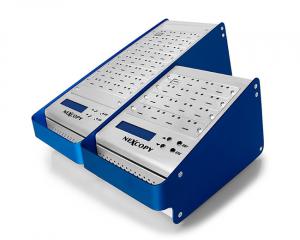Raspberry Pi devices can be finicky; using Nexcopy microSD Card Duplicator systems reduce errors, increase copy reliability and simple to operate.
— Mr. Morris
LAKE FOREST, CALIFORNIA, UNITED STATES, April 9, 2024 /EINPresswire.com/ — Nexcopy offers a robust standalone microSD Card Duplicator making it incredibly easy to clone Raspberry Pi cards with the click of a single button. The standalone system is available at a 15 target or 31 target cloning system.
The mSD115SA and mSD131SA are binary copiers which make digital copies of a physical master. The copy process will copy all boot code, partition information and data files to create a perfect digital copy of the master device.
The microSD Card Duplicator uses CRC 32-bit verification. CRC32 stands for Cyclic Redundancy Check 32-bit. It is a widely used checksum algorithm that calculates a 32-bit numeric value (or hash) to represent data, in order to detect errors in data transmission or storage. CRC32 is primarily used for error detection. By calculating a CRC32 checksum for a block of data before and after transmission or storage, one can compare these values. If the checksums differ, it indicates that the data may have been corrupted.
The Nexcopy eliminates frustration with our proven solution:
Some highlights for potential issues and frustrations which arise when using Raspberry Pi devices, particularly when encountering problems related to microSD card corruption. Let’s break down the reasons mentioned in more detail:
Power Outage
Raspberry Pi devices rely on stable power sources to function correctly. A sudden power outage or fluctuation can interrupt the writing process to the microSD card during microSD card duplication, leading to file system corruption or data loss. This can render the operating system on the microSD card unusable and require starting from scratch with a fresh installation.
Bad Cable
The quality and integrity of the power supply cable and the connection to the Raspberry Pi are crucial. A faulty or low-quality cable can lead to inconsistent power delivery, resulting in potential data corruption on the microSD card.
Overclocking
Overclocking a Raspberry Pi involves running the processor at a higher speed than its default settings to achieve better performance. While this can enhance performance, it also increases the risk of overheating and instability during microSD Card Duplication. Overclocking can put additional stress on the hardware and may lead to microSD card corruption if the system becomes unstable.
Other Issues
Various other factors can contribute to microSD card corruption or system instability during microSD Card Cloning on a Raspberry Pi. This might include software bugs, incompatible peripherals, or insufficient cooling leading to overheating.
Overall, despite the versatility and usefulness of Raspberry Pi devices, they can be temperamental and vulnerable to certain conditions. The inconvenience of dealing with a corrupt microSD card necessitates starting over with a new installation of the operating system and software.
The microSD Card Duplicator systems are available for immediate purchase from Nexcopy or global channel of authorized resellers. Data transfer speeds are dependent on the microSD card write speed.
Nexcopy manufactures a PC based microSD Card Duplicator which is able to read CID values, write CID values and assign write protection to microSD card media making the memory card read-only at the controller level. PC Based systems do operate through a graphical user interface (GUI).
Greg Morris
Nexcopy Inc
+ +1 949-481-6478
email us here
Visit us on social media:
Facebook
Twitter
LinkedIn
YouTube
![]()

























